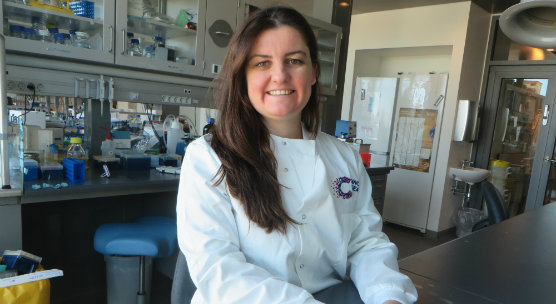Scientist awarded over £1 million to bring cutting-edge cancer research to Dundee
Published On Thu 6 Oct 2016 by Grant Hill

A talented international scientist has been awarded £1.35million from Cancer Research UK to bring her ground breaking research into how tumours develop to the University of Dundee.
Dr Constance Alabert is one of only three researchers this year to have been awarded a prestigious Career Development Fellowship by the charity.
Originally from France, Dr Alabert is currently based at the University of Copenhagen in Denmark. The funding will allow her to set up a research group at Dundee to study if the mechanisms cells use to maintain their identity and function during and after cell division – for example how skin cells remain skin cells – play a role in how cancers develop and grow.
One of the ways cells control whether genes are turned ‘on’ or ‘off’ is by placing epigenetic ‘tags’ on their DNA. But when cells are dividing, these tags are removed, meaning they need to be put back once cells have finished dividing.
Dr Alabert and her new team will seek to identify and understand the mechanisms cells use to put the tags back in the right place after cells have divided, and to find out whether they play a role in tumour development and growth.
She said, “We know that epigenetic ‘tags’ are important in controlling when cells grow and divide. But little is known about how these ‘tags’ are replaced after cell division or about the role – if any – this ‘replacing’ plays in tumour development. By understanding the mechanisms that replace these tags, we are hopeful we can identify new players in tumour development that have the potential to lead to new therapies.”
“It’s a great honour to have been awarded this fellowship from Cancer Research UK. Throughout my career the aim of my research has been to understand how cells work at a very fundamental level, so applying my work to help find out more about cancer brings a very human aspect to my research which is fantastic motivation for me.”
Cancer Research UK awards Career Development Fellowships to outstanding scientists to support them in establishing their own independent cancer research group.
World leaders in research have been discovered through the charity’s Fellowship Awards and the work they produce is of the highest international quality.
Karen Noble, Cancer Research UK’s head of training and fellowships, said, “To ensure we make a real difference in our fight against cancer, we need to recruit the best people and help them grow at every stage of their career.
“Our fellows make crucial discoveries that increase our fundamental understanding of cancer and help develop innovative new cancer medicines, tests and treatments.”
ENDS
For media enquiries please contact Victoria Steven in the Cancer Research UK press office in Scotland on 07818 421 467 or, out-of-hours, the duty press officer on 07050 264 059.
Notes to editors:
About Cancer Research UK
- Cancer Research UK is the world’s leading cancer charity dedicated to saving lives through research.
- Cancer Research UK’s pioneering work into the prevention, diagnosis and treatment of cancer has helped save millions of lives.
- Cancer Research UK receives no government funding for its life-saving research. Every step it makes towards beating cancer relies on every pound donated.
- Cancer Research UK has been at the heart of the progress that has already seen survival in the UK double in the last forty years.
- Today, 2 in 4 people survive their cancer for at least 10 years. Cancer Research UK’s ambition is to accelerate progress so that by 2034, 3 in 4 people will survive their cancer for at least 10 years.
- Cancer Research UK supports research into all aspects of cancer through the work of over 4,000 scientists, doctors and nurses.
- Together with its partners and supporters, Cancer Research UK's vision is to bring forward the day when all cancers are cured.
For media enquiries contact:
Grant Hill
Press Officer
University of Dundee
Nethergate, Dundee, DD1 4HN
Tel: +44 (0)1382 384768
Mobile: 07854 953277
Email: g.hill@dundee.ac.uk